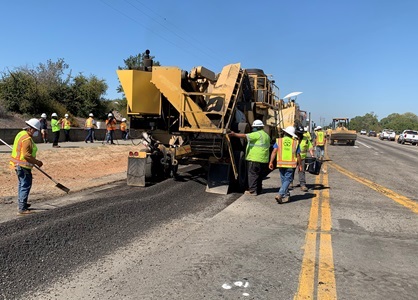The California Department of Transportation recently repaved a three-lane, 1,000-foot long section of Highway 162 using recycled asphalt pavement and liquid plastic made with single-use, plastic bottles – the first time the department said it has paved a road using 100 percent recycled materials.
[Above photo courtesy of Caltrans.]
The agency noted that such “plastic” roadways in previous test projects were found to be more durable and last two to three times longer than traditional hot-mixed asphalt pavement.
Using new technology developed by TechniSoil Industrial of Redding, CA, a recycling train of equipment grinds up the top three inches of pavement and then mixes the grindings with a liquid plastic polymer binder that comes from a high amount of recycled, single-use bottles. The new asphalt material is then placed on the top surface of the roadway, eliminating the need for trucks to bring in outside material for a paving operation. By eliminating the need to haul asphalt from the outside, this process can also help cut greenhouse gas emissions.
“This pilot project underscores the department’s commitment to embracing innovative and cost-effective technologies while advancing sustainability and environmental protection efforts,” noted Toks Omishakin, director of Caltrans, in a statement.
“Using waste plastic that was otherwise destined for a landfill will not only reduce the cost of road repair and construction, but also increase the strength and durability of our roads,” added California State Senator Ben Hueso, who has advocated that Caltrans test this material. “California is uniquely positioned to transform the transportation industry once again by using this new technology that could revolutionize the way we look at recycled plastic.”
Caltrans noted currently has a cold in-place asphalt recycling program that uses large machines to remove three to six inches of roadway surface and grind up the asphalt while mixing it with a foamed binding agent made of bitumen, a leftover sludge from oil refining. However, that recycled material used in this process is only durable enough to serve as the roadway base – and trucks must deliver hot-mix asphalt from a production plant located miles away and place a final layer over that base.
That’s why Amarjeet Benipal, director of Caltrans’ District 3, said the new plastic roadway process is better for the environment versus the cold in-place program. “It keeps plastic bottles out of landfills and helps reduce greenhouse gas emissions and reliance on fossil fuels,” he noted.
Several state DOTs are testing a variety of different products to help make roadway pavements more durable and environmentally-friendly.
The Minnesota Department of Transportation, for example, began testing a new asphalt additive along with two private companies in late 2018 along a stretch of Interstate 94 outside Albertville, MN, near the MnROAD research facilities – an additive designed to help highway agencies and contractors use more recycled asphalt and less “virgin” products. That additives – called a “rejuvenator” and made by agricultural conglomerate Cargill and aggregate supplier Hardrives – is a substance that promises to reverse the effects of aging when the existing asphalt roadway is recycled back into the new road.

